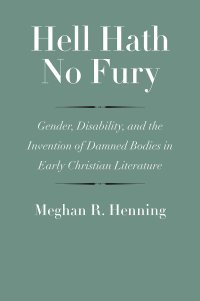
Ebook: Hell Hath No Fury: Gender, Disability, and the Invention of Damned Bodies in Early Christian Literature
Author: Meghan R. Henning
- Series: The Anchor Yale Bible Reference Library
- Year: 2021
- Publisher: Yale University Press
- Language: English
- pdf
The first major book to examine ancient Christian literature on hell through the lenses of gender and disability studies
“Enthralling, engaging, and challenging. . . . [Henning] has successfully given hell the right sort of attention, at last filling a major gap in the story and simultaneously charting new territory.”—Jarel Robinson-Brown, Los Angeles Review of Books
Throughout the Christian tradition, descriptions of hell’s fiery torments have shaped contemporary notions of the afterlife, divine justice, and physical suffering. But rarely do we consider the roots of such conceptions, which originate in a group of understudied ancient texts: the early Christian apocalypses.
In this pioneering study, Meghan Henning illuminates how the bodies that populate hell in early Christian literature—largely those of women, enslaved persons, and individuals with disabilities—are punished after death in spaces that mirror real carceral spaces, effectually criminalizing those bodies on earth. Contextualizing the apocalypses alongside ancient medical texts, inscriptions, philosophy, and patristic writings, this book demonstrates the ways that Christian depictions of hell intensified and preserved ancient notions of gender and bodily normativity that continue to inform Christian identity.
“Enthralling, engaging, and challenging. . . . [Henning] has successfully given hell the right sort of attention, at last filling a major gap in the story and simultaneously charting new territory.”—Jarel Robinson-Brown, Los Angeles Review of Books
Throughout the Christian tradition, descriptions of hell’s fiery torments have shaped contemporary notions of the afterlife, divine justice, and physical suffering. But rarely do we consider the roots of such conceptions, which originate in a group of understudied ancient texts: the early Christian apocalypses.
In this pioneering study, Meghan Henning illuminates how the bodies that populate hell in early Christian literature—largely those of women, enslaved persons, and individuals with disabilities—are punished after death in spaces that mirror real carceral spaces, effectually criminalizing those bodies on earth. Contextualizing the apocalypses alongside ancient medical texts, inscriptions, philosophy, and patristic writings, this book demonstrates the ways that Christian depictions of hell intensified and preserved ancient notions of gender and bodily normativity that continue to inform Christian identity.
Download the book Hell Hath No Fury: Gender, Disability, and the Invention of Damned Bodies in Early Christian Literature for free or read online
Continue reading on any device:

Last viewed books
Related books
{related-news}
Comments (0)